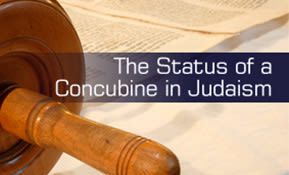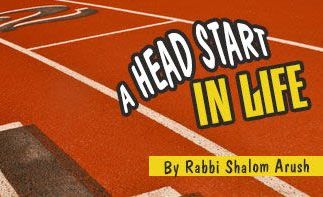
Above the Touch
True love between a husband and wife must be above and beyond any aspect of physical love, like the love between a brother and sister, totally pure...

Rabbenu Bachiya explains that the Creator created five gates in the human body – eyes, ears, nose, tongue and hands. They correspond to five senses – sight, hearing, smell, taste and touch. Three of these senses are spiritual – sight, hearing and smell. The other two – taste and touch – are physical. As we notice in the body, the eyes, ears and nose are higher than the tongue and hands. This is to convey that the three spiritual senses of sight, hearing and smell that stem from the eyes, ears and nose should reign over the two physical senses of taste and touch that stem from the tongue and the hands.
The Torah also uses the three spiritual senses in reference to Hashem. For example:
Sight: “And G-d saw that it was good” (Genesis 1:10).
Hearing: “And Hashem heard the sound of your words” (Deuteronomy 1:34).
Smell: “Hashem smelled the pleasing aroma (Genesis 8:21).
The Torah never attributes the physical senses of taste and touch to Hashem. Even though Rebbe  Nachman writes metaphorically that on Rosh Hashanah, Hashem “tastes” the good deeds that the Jewish People have done all year long, this of course refers to a spiritual type of enjoyment and not to a physical type, for Hashem defies any corporeal attributes. And as far as touching goes, the Torah uses this as an expression of man’s lack of spiritual cognizance, such as, “You will grope at noontime as a blind man gropes in the darkness” (Deut. 28:29), or, “We grope the wall like the blind, and like the eyeless, we grope” (Isaiah 59:10).
Nachman writes metaphorically that on Rosh Hashanah, Hashem “tastes” the good deeds that the Jewish People have done all year long, this of course refers to a spiritual type of enjoyment and not to a physical type, for Hashem defies any corporeal attributes. And as far as touching goes, the Torah uses this as an expression of man’s lack of spiritual cognizance, such as, “You will grope at noontime as a blind man gropes in the darkness” (Deut. 28:29), or, “We grope the wall like the blind, and like the eyeless, we grope” (Isaiah 59:10).
Since the sense of touch has become something that man is ashamed of, it is the only one of the five senses that there is no benediction for. We say blessings before using every other sense, such as:
Sight: We say a blessing when we see the new moon, when we see the ocean after not having seen it for 30 days, upon seeing a friend whom we haven’t seen for 12 months, upon seeing fruit trees blossom in the month of Nissan, upon seeing lightning or a shooting star and more.
Hearing: We make a blessing on hearing good tidings, on hearing painful news such as the passing of a loved one, and upon hearing thunder.
Smell: We make a blessing before smelling aromatic trees, plants, and fruit.
Taste: We say blessings before partaking of every type of food.
No blessings are associated with the sense of touch. For that reason, a person must pray profusely to uplift the mitzva of procreation – which is associated with the sense of touch – above the level of base lust and bodily pleasure. Hashem instilled this lust in man in order to give him free choice.
The Torah hereby tells us that the lust of fornication that is so closely tied to the sense of touch is a result of the evil inclination that entered man after the sin of eating the forbidden fruit. Until there was no influence of the evil inclination, there was no shame. Our spiritual goal is to return to the level of before the first sin, where we regard the act of procreation as a mitzva, and we approach it with emuna and not with the base desire of lust satisfaction and touch sensation. It is said in the name of Rebbe Levi Yitzchak of Berditchev that whoever harbors physical love for his wife in order to satisfy his own desire for physical gratification, loves himself and not his wife. Such love is far from true love and never lasts (see Avot 5:16).
Therefore, one should be careful with this lust if he desires to live a truly good life.
True love between a husband and wife must be above and beyond any aspect of physical love, like the love between a brother and sister. That’s why King Solomon writes (Song of Songs 4:9), “You have captured my heart, my sister, oh bride.” Their love must be pure, and not dependent on physical considerations.
With this in mind, we bless the bride and groom during the sheva berachot, the seven nuptial blessings, “Be happy and rejoice, loving friends, just as your Creator made you happy in the primordial Garden of Eden.” We bless the bride and groom that first of all, they should be best friends; then, they will be able to be lovers. We also bless them that their main joy should be from clinging to Hashem, like Adam and Eve did before they sinned. Their bond should be deep and lasting, a bond of emuna and not a sorely temporary relationship based of physical attraction. Since the body is finite and the soul is eternal, bodily-oriented relationships are doomed to separation, whereas soul-oriented relationships last forever.
Personal holiness means that one has freed himself from the clutches of sexual lust, and maintains physical relations entirely within the framework of performing the Torah’s two marital commandments of pria u’rvia, “being fruitful and multiply”, and ona, conjugal relations. Personal holiness is the basis of spiritual purity, the foundation of a truly happy marriage.







12/10/2015
not sure about touch and brachot, nor about taste/smell/hearing
No blessings associated with touch — I need this clarified further. Aren't we to hold food in the right hand when we bless? Does "le-haniach tefillin" not count? "al netilat yadaim"? Are the brachot on food even dependent on having a sense of taste? Does the body benefit from a good smell? (I had heard it was just the soul)? Does a person need to hear the good news to make a bracha on it? Sight's the only one I don't doubt. (I ask these questions not knowing their answers. )
12/10/2015
No blessings associated with touch — I need this clarified further. Aren't we to hold food in the right hand when we bless? Does "le-haniach tefillin" not count? "al netilat yadaim"? Are the brachot on food even dependent on having a sense of taste? Does the body benefit from a good smell? (I had heard it was just the soul)? Does a person need to hear the good news to make a bracha on it? Sight's the only one I don't doubt. (I ask these questions not knowing their answers. )